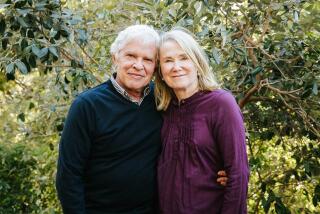Gerald Gunther, 75; Stanford Law Lecturer, Scholar
- Share via
Gerald Gunther, one of the country’s most respected constitutional law scholars whose childhood in Nazi Germany drove him to fight for the protection of civil liberties, died Tuesday. He was 75.
Gunther, also known for writing a widely used constitutional law textbook and a definitive biography of his mentor, Judge Learned Hand, died of lung cancer at his home in Palo Alto, said his son, Daniel Gunther.
Gunther taught at several law schools, including a 40-year stretch at Stanford University, where he continued to lecture after retiring in 1995. Before teaching, Gunther was a clerk for Hand, a U.S. Court of Appeals judge, and U.S. Supreme Court Chief Justice Earl Warren.
During the 1970s and ‘80s, Gunther’s name was often mentioned as a U.S. Supreme Court candidate, with a 1987 National Law Journal poll ranking him as best qualified for the post. However, Gunther never got the call.
He mentored several leading lawyers and jurists, including Supreme Court Justice Ruth Bader Ginsburg and Stanford Law School Dean Kathleen M. Sullivan.
Ginsburg called Gunther the country’s leading constitutional law scholar and judicial biographer.
“His commentary, and the counsel I retain in my mind, will continue to guide me through all my days on the bench,” she said in a statement.
Sullivan called Gunther a “constitutional oracle” who loved counseling students as much as he enjoyed firing off letters to institutions he thought were restricting people’s speech, including Stanford. But he was also a modest man, she said, so shy he could barely ask her for help with the most recent two editions of his textbook.
“He was a towering giant in the field of constitutional law,” Sullivan said. “But I hasten to add, a gentle giant. For all of his prestige and respect and fame, he was always quite humble when relating to others.”
Gunther’s children described him as a soccer enthusiast and history buff who especially enjoyed books on the country’s early court system. But they added that his life is best illustrated through his work.
“You see a lot of the man through his scholarly pursuits because for him, legal work was a way to use his intellect to make a better world and to care for other people,” said Daniel Gunther, a lawyer in San Francisco.
Gunther said his father cared so much about civil liberties because he had experienced their absence while growing up in Usingen, Germany, a town near Frankfurt. Since the family’s roots in the town extended three centuries, they were reluctant to leave despite laws against Jews. But when the town’s synagogue was burned in 1938, 11-year-old Gunther fled with his family to Brooklyn, N.Y.
“He’d seen a legal system turned inside out and put in the service of a tyrannical order,” Daniel Gunther said. “A legal career gave him a way of fighting back and providing meaningful protection to all kinds of people in a civilized, respectful way.”
Gerald Gunther’s defense of civil liberties included freedom of speech and extended to American Nazis, who in 1976 marched in Skokie, Ill., despite threats of violence and the protests of Holocaust survivors.
He wrote about the incident in the Stanford Law Review, saying that permitting actions that people found offensive “is a central test of a community’s commitment to free speech.”
His writings also included the 1994 biography, “Learned Hand: The Man and the Judge,” an award-winning book based on 22 years of research and writing. Gunther also wrote “Constitutional Law,” the most widely used textbook on the subject in American law schools during the 1960s and ‘70s.
The late Supreme Court Justice Lewis F. Powell Jr. wrote in 1994 that the casebook was “the leading publication in the field, from which a generation of American lawyers have learned constitutional law.”
Gunther’s students said his classes had a profound impact on their understanding of constitutional law.
“He brought constitutional law to life, not with flash or witticisms but with his intellect and encyclopedic knowledge of constitutional law,” said Andy White, a Century City attorney who became interested in 1st Amendment law after taking Gunther’s class as a Stanford student in the 1970s.
Gunther loved telling stories about historical figures and the legal world--whether to his students or to his grandchildren--though they sometimes went off track, said Los Angeles lawyer and former student Robert C. Vanderet.
“He would sometimes get lost in thought while lecturing and forget the beginning of a sentence he had started as his mind drifted off on a tangent,” Vanderet said. “But the tangents often turned out to be fresh, brilliant insights that were well worth the wait.”
A graduate of Brooklyn College, Gunther received a master’s degree in public law and government from Columbia and a law degree from Harvard, where he was editor of the law review.
In addition to his son, Daniel, Gunther is survived by his wife, Barbara; another son, Andrew of Santa Cruz; a brother, Herbert Gutenstein of Riverdale, New York; and two grandchildren.
More to Read
Sign up for Essential California
The most important California stories and recommendations in your inbox every morning.
You may occasionally receive promotional content from the Los Angeles Times.













